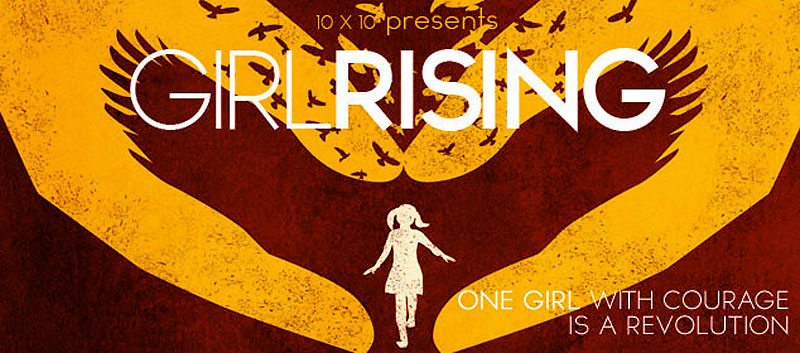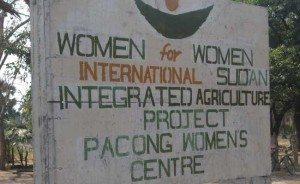Rising up for Women’s Week
Faizan Sadiq, Edita Alic, Ellie Rafe, Emefa Abla Tsikata & Hayyin Fan call us to action for Women’s Week
The shooting of Malala Yousafzai by the Taliban in 2012 attracted international horror and global recognition for the rights she advocated, the right for women to be educated. Although the shooting was an attempt to suppress her prominent activism in supporting these rights, it has had the paradoxical effect of enabling Malala’s voice to be heard and for her to globally articulate women’s rights. However Malala is one of many inspirational girls who have overcome adversity in order to advocate equality for women. Women for Women International Warwick recognises how universal empowerment requires all women and men to unite together for this message to be shared.
Thus the screening of the film Girl Rising on Thursday 6 March 2014, with Warwick Hub, has been chosen as part of the promotion for Women’s Week. This is because it illustrates some of the issues which are currently being faced by women in war-torn countries including Afghanistan and South Sudan. The film also captures the ideals that our society dreams of: those of liberation, hope and defying the denial of education of women. The film features nine inspirational girls in the developing world who each have their own individual stories to share. These narratives include the story of Suma, a girl from who composed music to help her cope with servitude in Nepal, to Sokha, an orphan who overcame deprivation in Cambodia to become a talented student and dancer. Although each girl has her own story to tell, they are all united. Through their unwavering hope and courageous determination in rising above their conditions, their stories are helping to prevent others suffering from what they have had to face.
This truly unique film is part of the global movement to promote education as the most effective way of combatting poverty. It features voice performances from influential actresses such as Meryl Streep, Anne Hathaway, and Cate Blanchett, as well as involving distinguished writers from each girl’s native country who help in the telling of their remarkable stories. These writers include Edwidge Danticat, Sooni Taraporevala, and Aminatta Forna. It also features original music from Academy Award winner Rachel Portman, in collaboration with Hans Zimmer, demonstrating how global, collective action is being taken.
The screening of this movie is just one of the many highlights taking place during Women’s Week, celebrating the progress of women’s rights in the last century but also raising awareness of the growing political, sexual and violent unrest millions of women face every day. On Monday 3rd March, Women for Women International will hold a Bollywood Dance session, to mark the current revolutionary events in India surrounding female rights and to get people together having fun but most importantly, to get people discussing the importance of the emancipation of women on a truly international level. On Tuesday and Wednesday, there is a bake sale to raise money for some of the most vulnerable women in the world, but also to spread awareness of this important annual event. On Friday an event called ‘Join Women on the Bridge’ will take place, which has grown into a global movement with tens of thousands standing together on bridges around the world to call for peace and equality. Last but not least, Saturday will see many participants raising money by running for ‘My Step Her Stride’ around Leamington Spa, which primarily raises money and awareness for the women in the Democratic Republic of the Congo having to deal with the rape epidemic that accompanies the political conflict.
As a Washington based charity, Women for Women International aims to help victimised women in war torn countries to get back on their feet by enrolling them in a unique one year professional programme. The organisation believes in empowerment through economic self-sufficiency which in turn builds a woman’s self esteem, confidence and reminds her of her value by instilling invaluable professional skills to sustain her livelihood as well as donating adequate sums of money to support her and her family. The charity was founded by a remarkable Iraqi-American writer and social entrepreneur Zainab Salbi in 1993, who was moved after seeing troubling images of rape victims in Bosnia and Herzegovina. Volunteering opportunities were scarce, so Salbi took the initiative by developing the “sister-to-sister” programme, which connected the donors directly to their recipients. The organisation has since grown from its humble beginnings to what it is today, working in eight different countries including Afghanistan, Democratic Republic of Congo, Iraq, Kosovo and South Sudan. What makes the charity so unique is its approach, by placing emphasis on the long term, as opposed to short term donations that have no positive impact on its recipients. The one year job training program was established to give women skills relevant to a particular job as well as business advice. The charity aims to educate women about their rights and how to fight for them both in their domiciles and their communities at large. The aim is to bring out the leadership qualities in each woman to empower her to strive for her aspirations. Women for Women International believes that lasting change can only be achieved when women have access to both knowledge and resources, therefore these are a top priority for the organisation.
Girl Rising and the other events taking place during Women’s Week can be interesting and enjoyable, but it is important to understand the wider, sociopolitical basis of Women’s Week. As the founder of the charity, Zainab Salbi, said: ”the more silent we are, the more we are part of the vicious cycle that hurts women.” Educating women in these situations transforms, not simply their own lives, but also the lives of their families and the communities in which they reside. On a wider, and more profound level, the struggles and the progress they exhibit demonstrates the change that we can make as students at Warwick.


Comments